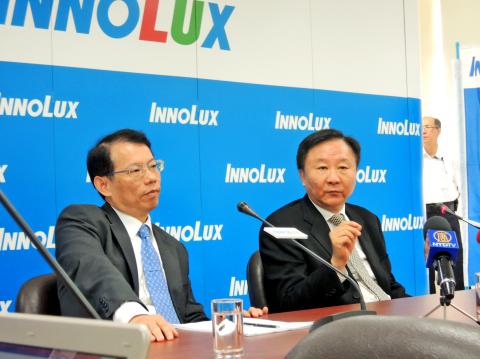Innolux Corp (群創光電), the world’s fourth-largest LCD panel maker, yesterday said it expects a solid second half on the back of increasing demand for panels for notebook computers and ultra-high-definition TVs.
The company said its shipments of 4K2K TV panels grew in March and April, ahead of the FIFA World Cup.
Statistics compiled by market researcher NPD DisplaySearch showed that shipments of flat-panel TVs to World Cup host Brazil soared 57 percent year-on-year to 3.3 million units in the first quarter.

Photo: Chen Mei-ying, Taipei Times
Innolux said it expects the growth momentum to extend into September, when television makers start restocking in preparation for the October holiday shopping spree in China.
“The second quarter will be a better period than the first quarter, and we expect a vigorous second half as well,” Innolux president Wang Jyh-chau (王志超) told reporters after the firm’s annual general meeting.
Panel supplies for mainstream 39-inch, 40-inch and 42-inch TVs have tightened lately, while demand for TV panels bigger than 50-inches has also grown rapidly, Wang said.
In addition, global demand for 4K2K TVs has picked up at a faster-than-expected pace, he said.
“In April, worldwide 4K2K TV penetration jumped to 6.8 percent of overall flat-panel TVs, from 4 percent in March,” he said. “Client demand for ultra-high-definition TV panels bigger than 40 inches has exceeded what we can supply.”
Wang said he expects the global 4K2K TV penetration rate to exceed 10 percent this year — higher than market forecasts of between 6 and 9 percent.
Innolux is the world’s largest 4K2K TV panel supplier, with a 36 percent market share.
Wang said the company was sticking to its projection that 4K2K panels would account for 20 percent of its TV panel shipments this year.
Asked about the notebook panel supply constraint, Wang attributed it to reduced supply because most panel makers have allocated their capacity to making panels for other applications.
However, it seems that notebook shipments would be stronger than expected this year, he said.
For the whole year, Wang still expects the supply-and-demand situation to remain healthy.
“Market demand is quite good this year,” Innolux chairman Tuan Hsing-chien (段行建) told reporters. “We believe this year and next year will be the turning point... The worst period for the TFT [thin film transistor] industry is over.”
Shareholders yesterday approved a plan to issue 2 billion common shares via a rights issue, or in the form of global depositary receipts. They also gave the green light to a proposal to distribute a cash dividend of NT$0.15 per share, based on last year’s net profit of NT$5.1 billion, or NT$0.57 per share.
That translates into a dividend yield of 1.23 percent, based on the stock’s closing price of NT$12.20 yesterday.

Semiconductor shares in China surged yesterday after Reuters reported the US had ordered chipmaking giant Taiwan Semiconductor Manufacturing Co (TSMC, 台積電) to halt shipments of advanced chips to Chinese customers, which investors believe could accelerate Beijing’s self-reliance efforts. TSMC yesterday started to suspend shipments of certain sophisticated chips to some Chinese clients after receiving a letter from the US Department of Commerce imposing export restrictions on those products, Reuters reported on Sunday, citing an unnamed source. The US imposed export restrictions on TSMC’s 7-nanometer or more advanced designs, Reuters reported. Investors figured that would encourage authorities to support China’s industry and bought shares

FLEXIBLE: Taiwan can develop its own ground station equipment, and has highly competitive manufacturers and suppliers with diversified production, the MOEA said The Ministry of Economic Affairs (MOEA) yesterday disputed reports that suppliers to US-based Space Exploration Technologies Corp (SpaceX) had been asked to move production out of Taiwan. Reuters had reported on Tuesday last week that Elon Musk-owned SpaceX had asked their manufacturers to produce outside of Taiwan given geopolitical risks and that at least one Taiwanese supplier had been pushed to relocate production to Vietnam. SpaceX’s requests place a renewed focus on the contentious relationship Musk has had with Taiwan, especially after he said last year that Taiwan is an “integral part” of China, sparking sharp criticism from Taiwanese authorities. The ministry said

US President Joe Biden’s administration is racing to complete CHIPS and Science Act agreements with companies such as Intel Corp and Samsung Electronics Co, aiming to shore up one of its signature initiatives before US president-elect Donald Trump enters the White House. The US Department of Commerce has allocated more than 90 percent of the US$39 billion in grants under the act, a landmark law enacted in 2022 designed to rebuild the domestic chip industry. However, the agency has only announced one binding agreement so far. The next two months would prove critical for more than 20 companies still in the process

CHANGING JAPAN: Nvidia-powered AI services over cellular networks ‘will result in an artificial intelligence grid that runs across Japan,’ Nvidia’s Jensen Huang said Softbank Group Corp would be the first to build a supercomputer with chips using Nvidia Corp’s new Blackwell design, a demonstration of the Japanese company’s ambitions to catch up on artificial intelligence (AI). The group’s telecom unit, Softbank Corp, plans to build Japan’s most powerful AI supercomputer to support local services, it said. That computer would be based on Nvidia’s DGX B200 product, which combines computer processors with so-called AI accelerator chips. A follow-up effort will feature Grace Blackwell, a more advanced version, the company said. The announcement indicates that Softbank Group, which until early 2019 owned 4.9 percent of Nvidia, has secured a